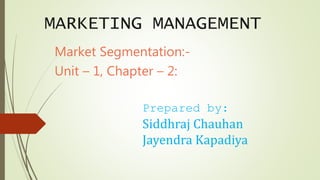Market segmentation
- 1. MARKETING MANAGEMENT Market Segmentation:- Unit â 1, Chapter â 2: Prepared by: Siddhraj Chauhan Jayendra Kapadiya
- 2. Market Segmentation ïīContents include: 1. What is Market Segmentation ? 2. Need for Segmenting Market. 3. Criteria for Successful Segmentation. 4. Segmenting Consumer Market.
- 3. * What is Market Segmentation ? According to Philip Kotler, âMarket Segmentation is the process of dividing a market into distinct subgroups of consumers with distinct needs, characteristics or behaviour, who might require separate products or marketing mixes.â
- 4. Need for Segmenting Market: 1. Efficient use of marketing resources. 2. Better umderstanding of consumer needs 3. Better understanding of the competitive situation. 4. Accurate measurement of goals and performance.
- 5. Criteria for Successful Segmentation: 1. Identity 2. Accessibility 3. Responsiveness 4. Size 5. Nature of Demand 6. Measurability
- 6. Bases for Market Segmentation * Geographic Segmentation: âĒ Nations âĒ Regions âĒ States âĒ Cities âĒ Urban âĒ Rural âĒ Semi-urban âĒ Neighbourhoods E.g. Woollen clothes sold in North India, PCs & Laptops sold in Cities, Tractors & Fertilizers sold in Rural areasâĶ
- 7. * Demographic Segmentation: ïī Age ïī Gender ïī Family Size ïī Family life cycle ïī Income ïī Occupation ïī Merital Status ïī Religion ïī Education ïī Race ïī Generation ïī Nationality E.g. Garments-Children's, Women's, Menâs Cosmetics & toiletries-Beauty aid for women & shaving aid for men Airlines-Economy class, Club/Executive class Fridge-Size like 200,250,300 litres for different family size
- 8. * Psychographic Segmentation: ïī Social Class ïī Life style ïī Personality ïī Spiritual Status ïī Feelings ïī Values ïī Attitude E.g. Coke & Pepsi-Popularity in Villages Titan Watches-FastTrack meant for teenagers for casual, stylish look Mercedes Benz-Social & Elite Status
- 9. * Behavioural Segmentation: ïī Knowledge ïī Preference ïī Attitude ïī Brand Loyalty ïī Moral ïī Response ïī Uses ïī Price Sensitivity E.g. Occasions-Jewellery & Saris on Festival & Wedding Benefits-Fortuner Car, Creta car
- 10. Thank you
Editor's Notes
- Prepared by : Jayendra Kapadiya Siddhraj Chauhanh









